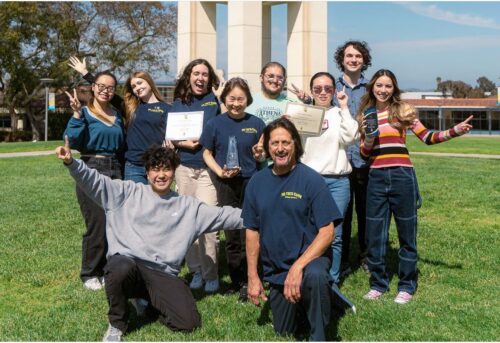Among the superheroes, princesses, and monsters trick or treating in St. Louis Park, Minnesota, this Halloween was someone unexpected: Dmitri Mendeleev, the creator of the periodic table. Behind the costume was 10-year-old Elliott Tanner.
 It isn’t your typical choice for a costume, but Elliott isn’t a typical kid. He’s a student at Normandale Community College, where he’s four classes away from getting two associate degrees, one in mathematics and one in physics. He’s also one of the youngest students ever inducted into Phi Theta Kappa.
It isn’t your typical choice for a costume, but Elliott isn’t a typical kid. He’s a student at Normandale Community College, where he’s four classes away from getting two associate degrees, one in mathematics and one in physics. He’s also one of the youngest students ever inducted into Phi Theta Kappa.
“I feel no different from all the 20- to 30-year-olds in all my classes,” he said. “I feel like it’s a perfect fit for me. It’s one of the best educational chances my mom has ever given me.”
Elliott’s mom and dad, Michelle and Patrik, knew early on that he was advanced. He was raising his head the day after he was born, Michelle said. At four weeks, he rolled over on his own. He started trying to read when he was around 18 months old, and by 3 he was reading chapter books.
An achievement test at 5 and an IQ test at 6 confirmed Elliott was gifted. He entered kindergarten in a local Spanish-immersion public school. While it provided good social interaction and the opportunity to learn another language, it couldn’t meet his other needs, and they could see that Elliott was miserable.
“He had interests other kids his age didn’t have,” Michelle said. “He wanted to talk about particle acceleration, and the other kids wanted to talk about superheroes. He had learned his multiplication tables by then. He became like a teacher’s assistant.”
Michelle and Patrik decided to homeschool Elliott. They utilized workbooks and online resources as he progressed through algebra and geometry. When he passed his parents’ abilities, he took junior high- and high school-level classes online and through the local homeschool co-op.
Elliott was mastering three or four years’ worth of material in a single school year, so his parents approached Normandale Community College as a next step. In the summer of 2017, Elliott took his first college course online. That fall, at 9 years old, he started on campus.
“I always thought of myself as being ordinary until I saw what actual ordinary was,” Elliott said. “It’s kind of hard knowing you’re extraordinary; it’s kind of weird.
“I’m kind of like a puzzle piece, and I fit perfectly in the puzzle of college.”
Michelle, a professional photographer, typically waits on campus while Elliott is in class. She and Patrik, a musician and music producer, have flexible schedules, enabling them to support Elliott’s untraditional education.
 “We’ve been able to meet his needs academically, and that’s probably been significant in his development,” she said.
“We’ve been able to meet his needs academically, and that’s probably been significant in his development,” she said.
They’ve wondered if Elliott’s giftedness runs in the family. Michelle considers herself bright — she’s also a Phi Theta Kappa member — and said her husband is very intelligent in his field. Patrik’s father, a former engineer who taught himself six languages, was likely gifted as well, she said, and could be where Elliott gets his talents.
College has been a transition for Elliott, but not necessarily in the way you’d expect. He had to get used to a schedule and to having homework. He also had to learn social norms like raising his hand in class.
His social circle has widened too. He attends Phi Theta Kappa meetings, and he’s also in the Math and STEM Clubs. And, he finally has people he can talk to about particle acceleration.
“We’ve grouped his friends by what they know and their shared interests, and it really clicked for him then,” Michelle said. ” ‘This is who I can talk about math with, this is who I can talk about Pokémon with.’ “
He has friends his age in his neighborhood that he can ride bikes with, and he has connected with other gifted students. He plays the piano and the guitar, and he likes archery and chess.
“And he can hold his own in a conversation with a college student about calculus or differential equations,” Michelle said. “He’s very balanced.”
Michelle and Patrik are following Elliott’s lead on his education. The ability to take classes he enjoys and that are at his level has made all the difference. Elliott said his statistics class was an especially fun one, and he enjoyed his computer programming class too.
And, despite the age difference with his peers, Elliott said he prefers to be in the classroom instead of taking classes online.
“It’s nice to be able to talk to somebody about school and go over homework or share ideas,” he said.
Elliott has taken nearly every math class Normandale offers. Right now, the plan is for him to transfer to the University of Minnesota in the fall of 2019.
Michelle said she often has to remind herself that, while their situation is normal to them, not every family is like theirs. Elliott does so many things that a typical 10-year-old doesn’t do, but she’s said it’s been exciting to watch him thrive.
For Elliott, his age is just a number.
“All you have to do is think you can do it and put your mind to it,” he said. “Don’t feel weird in a class of 20-year-olds when you’re only 10. What really matters is how much you want to be there.”




